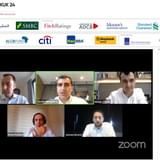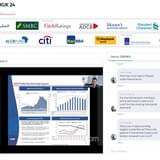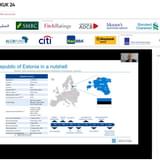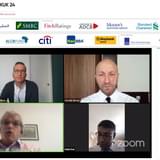lslamic finance looks set to experience some impressive growth, and, by most accounts Turkey’s participation banks are well positioned to see much the same. By the end of 2015, it is estimated that the total size of the global interest free financial system was around US$2tn, and could reach volumes of between US$3.2tn and US$3.6tn by 2020. Sharia-compliant assets only account for about 1.3% of global assets, according to data compiled by Standard & Poor’s and the Participation Banks Association of Turkey (PBAT), which suggests significant room for growth.
Many of those Sharia-compliant assets are concentrated in the Middle East and Muslim countries in Asia. About 65% of total global Islamic assets are held by Malaysia (US$415bn), Saudi Arabia (US$413bn) and Iran (US$345bn). Turkey holds just a fraction of the global share of Islamic assets, but that share is growing as the domestic market matures.
According to data from the Turkish Central Bank, compound annual growth of Islamic assets in Turkey came in at 22% between 2010 and 2015, compared with 16% for conventional banking assets. Much of that growth has come through retail operations. Between 2004 and 2015, Turkish participation banks have added nearly 900 branches in the country and, between 2012 and 2015, increased their assets from TRY70.2bn to over TRY120bn.
In addition, the launch of Ziraat Participation last year and the establishment of Vakıf Katılım in early 2016 has further boosted expectations for the sector’s further growth, despite the fact that Islamic assets continue to represent just 5% of total assets in the Turkish banking system.
“The use of lease certificates and murabaha could be set an example of increasing the efficiency of existing products and to reach a higher number of individuals. The growth in trade volumes with the MENA region and Islamic countries, and the public authorities’ policies to support SMEs will be factors stimulating the use of participation banking products and services by the private sector,” the PBAT explained in a recent report.
The Treasury has also been relatively active in the local market, issuing a TRY1.8bn 2-year Ijara sukuk in February 2015 and another TRY1.6bn 2-year Ijara sukuk in August 2015. The Treasury is also trying to help set a benchmark for other Turkish corporates to issue sukuk. Osman Çelik, Undersecretary of Turkey’s Treasury – and Chairman of the PBAT – said the government is keen to issue lease certificates (sukuk) both domestically and internationally going forward.
“As you know, US dollar market is our main market for external financing. On the other hand, we closely monitor different markets as part of our diversification strategy,” Çelik says.
In Turkey, participation banks are among the biggest issuers of sukuk or lease certificates outside of the Government, particularly as new banking regulations prompt the need to issue capital-boosting securities. These instruments are also an effective way of soaking up liquidity from investors based in the Middle East. Albaraka Turk saw strong demand from the MENA region (where over 90% of the notes were allocated) for its US$250mn Basel III-compliant Tier II sukuk, the first seen from Turkey, against a backdrop of emerging market turmoil and political volatility in November last year.
Kuwait Finance House Turkey (Kuveyt Türk), arguably the leading Islamic bank in Turkey and the first to issue the country’s debut dollar sukuk in 2010, this February launched a US$350mn capital boosting sukuk in what became the first international sukuk to emerge from the country since the start of 2016. About 94% of the Islamic notes were placed with accounts based in MENA. It followed that up with a TRY300mn 179-day sukuk in May.
Outside of the FI space and the public sector, however, sukuk issuance has been almost non-existent in Turkey. Between 2010 and 2015 US$7.7bn worth of sukuk have been issued by the sovereign in Turkey, and US$4.07bn by the country’s banks, according to the Capital Markets Board of Turkey. Globally, corporate sukuk accounted to 39% of all sukuk issued in 2015 according to the International Islamic Financial Market, an institute devoted to sukuk standardisation.
Many have long anticipated growth in corporate sukuk issuance from Turkish entities, but for now they seem to be refraining. Agaoglu Group, which issued a TRY100mn 1-year sukuk in 2013, said in 2014 that it planned to issue its first international sukuk US$30mn, while Dogus Asset Leasing secured approval for a US$370mn the same year. But those deals have yet to materialise. Part of this can be put down to three things: incentives, transaction structure flexibility and the relative youth of the sukuk market in Turkey.
The government has been fairly proactive in developing the Islamic capital markets in Turkey, though much more recently than some might expect. In July 2012 the Public Finance Law no. 4749 was amended to permit the issuance of sovereign sukuk, followed in September by the country’s debut US$1.5bn sukuk. In June this year the government ended an 18-month absence from the international Islamic capital markets when it raised US$1bn through a 5-year sukuk yielding MS+290bp.
In August the government passed an omnibus bill aimed at reducing transactional costs associated with investing in lease certificates. The bill mostly pertains to existing tax legislation and enhances the way certain Islamic finance instruments are recognised or treated for Turkish tax purposes. It includes tax exemptions for Ijara transactions, including moveable assets (previously only applied to immovable assets) and exemptions for underlying asset transfers, and an extension of certain stamp tax exemptions to Wakala, Istisna and Musharaka transactions. The reform essentially ensures that corporate income tax will not be levied on the income derived from sale and purchase back of sukuk assets, a boon for prospective issuers, and something analysts believe could open up the market for more corporates in Turkey.
Between 2001 and 2015, Turkey has accounted for less than 2% of global sukuk issuance according to the IIFM. But there are more reasons to see that share expand, rather than contract, going forward. The prominent and growing role of participation banks in Turkey, coupled with the government’s efforts to extend tax benefits and legal clarity to a wider range of sukuk structures, and the willingness of key financial and policymaking institutions to support and develop the market will help stoke corporate sukuk issuance in the country.
It is also possible that Istanbul’s bid to become a regional, and down the road, global financial centre – through the Istanbul International Financial Center (IIFC), which could one day rival Dubai’s International Financial Center as a regional hub for Islamic and conventional finance – may help put Turkey’s participation banks on the world map alongside other global Islamic finance players in Malaysia, the UAE, and Kuwait.









